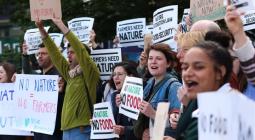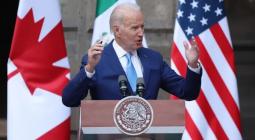The Guardian view on Europe’s green deal: blowing in the wind?

A
The world cannot afford for Europe to cool on its climate commitments. But as conservatives seek to turn the green deal into a dividing line, progressive leaders must respond to the threat where they have the power to do so. Much more needs to be done to persuade the less well-off and rural communities that they will be looked after in a time of upheaval. A renewed focus is needed on meaningful subsidies – for example, for homeowners switching to renewable forms of energy – and viable future pathways for those working in affected industries. Brussels’ plan for a €87bn “social climate fund”, due to be phased in from 2026, is nowhere near enough, given the scale and urgency of the task.
A new age of economic and geopolitical insecurity has made a challenging transition even tougher. In the face of political headwinds, it will not be accomplished on the cheap.
European parliament plenary vote, held in mid-July, might normally pass under the radar of all but the most passionate aficionados of Brussels politics. That will not be the case next week, when environmental campaigners will watch through their fingers as one of the most consequential decisions so far is made in relation to the EU’s net zero targets.
Before heading for their summer holidays, MEPs are expected to vote on a proposed nature restoration law, committing European governments to rehabilitate and rewild swathes of territory suffering from desertification, deforestation and the draining of peatlands. Along with action on pesticides, this is essentially the biodiversity strand to the EU’s green deal. The law’s role in facilitating carbon capture and creating healthy, resilient ecosystems is deemed indispensable by scientists, if emissions reduction targets are to be met. But as with other aspects of the green transition, Europe’s increasingly dominant right is now mounting a sustained campaign to derail it.
In the context of post-Ukraine economic pressures and priorities, the European People’s party (EPP) – which groups together centre-right parties – is arguing for a pause in environmental legislation. To that end, the EPP has allied with the climate-sceptic far right in Brussels, and is set to oppose the restoration law. As a result, next week’s vote is on a knife edge. But the broader picture is still more disturbing.
Amid concerns over the cost of living crisis, and a growing challenge from populist anti-green parties across Europe, mainstream conservatives are increasingly viewing opposition to the timetable and cost of the net zero transition as smart politics. In Germany, the extreme nationalists of Alternative für Deutschland are vying for second place in the polls, after leading attacks on government plans for the conversion of home heating systems to renewable energy. The centre-right Christian Democratic Union, which before the last election was contemplating coalition with the German Greens, is duly tacking in the same direction.
In Spain – where a snap election this month may see the far right enter government for the first time since the return of democracy – the high-profile conservative mayor of the Madrid region has accused the left of overstating the gravity of the climate crisis. Elsewhere, the rise of the Farmer-Citizen Movement in the Netherlands, which opposes attempts to reduce nitrogen emissions from intensive farming, has come to symbolise a potential rural backlash against net zero targets. Centre-right parties, for which agricultural regions are traditional strongholds, are rushing to represent the cause.
The world cannot afford for Europe to cool on its climate commitments. But as conservatives seek to turn the green deal into a dividing line, progressive leaders must respond to the threat where they have the power to do so. Much more needs to be done to persuade the less well-off and rural communities that they will be looked after in a time of upheaval. A renewed focus is needed on meaningful subsidies – for example, for homeowners switching to renewable forms of energy – and viable future pathways for those working in affected industries. Brussels’ plan for a €87bn “social climate fund”, due to be phased in from 2026, is nowhere near enough, given the scale and urgency of the task.
A new age of economic and geopolitical insecurity has made a challenging transition even tougher. In the face of political headwinds, it will not be accomplished on the cheap.
cover photo:‘MEPs are expected to vote on a proposed nature restoration law, committing European governments to rehabilitate and rewild swathes of territory.’ Photograph: Rex/Shutterstock





